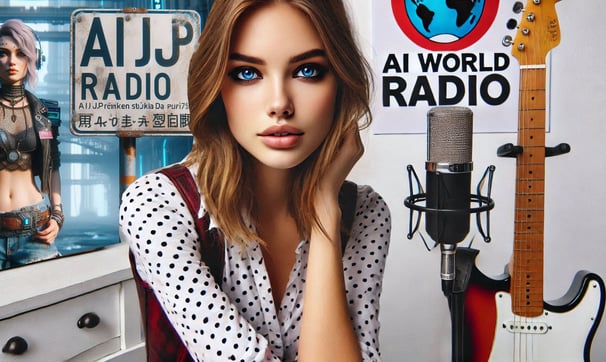A Musical Record Broken by Artificial Intelligence
AI WORLDFEATURED


2,500 poems, 30 languages, 1 world — music reborn through artificial intelligence. AI sings the past, present, and future in every language.
Artificial intelligence continues to push the boundaries of art and music. In a remarkable project initiated by journalist and writer Jan Paçal, AI-generated compositions have reached an unprecedented scale. More than 4,900 poems have been turned into musical pieces through advanced AI models—of which over 2,500 have already been published across various digital platforms, marking a new milestone in AI-assisted music creation.
Interestingly, the project didn’t begin as a grand enterprise. As Paçal puts it, this was originally “just a hobby.” But in a short time, it evolved into a global movement in digital creativity.
AI JP RADIO and AI WORLD RADIO: The Future of Multilingual Broadcasting
At the heart of this achievement are two innovative radio projects: AI JP RADIO and AI WORLD RADIO. Each plays a distinct role in the project’s global expansion:
AI JP RADIO focuses solely on Turkish-language broadcasts, featuring compositions and poetry in Turkish.
AI WORLD RADIO, on the other hand, brings the AI-generated songs to life in over 30 world languages, including English, Spanish, Japanese, Armenian, Mongolian, Greek, Latin, and even ancient Turkic.
This multilingual approach has transformed the project from a tech experiment into a cultural bridge that unites listeners from all corners of the world.
YouTube: Taking the Vision to the Visual World
The expansion didn’t stop at radio. With growing interest, the project launched a YouTube channel that offers weekly releases in video format. These clips pair audio compositions with visually engaging content that highlights the text and cultural identity of each language.
Some videos have already gained thousands of views, with comments flooding in from viewers across continents. Many describe the experience as “soothing,” “educational,” or “a new way to connect with the world through poetry.”
Paçal explains:
“People don’t just want to hear a language—they want to see it, feel it. YouTube helps us deliver a deeper, multi-layered artistic experience.”
Bridging Centuries of Poetry
One of the most fascinating aspects of the project is its literary diversity. The musical compositions don’t just rely on newly written poems. They also include works by poets from the medieval period all the way to contemporary times.
Poetry from famous historical figures as well as undiscovered or regional artists has found a new voice through AI-generated compositions. This blend of heritage and innovation creates a powerful emotional experience for the listener.
Moreover, the project has attracted the interest of living poets from around the world, many of whom have submitted their own works to be transformed into music by AI. This growing participation has significantly expanded the project’s scope and creative range.
“It’s turning into a global movement,” says Jan Paçal. “We now receive weekly submissions from poets in different countries, eager to see how their verses come alive in music and across languages.”
Reviving Ancient Languages with AI
One of the most ambitious aspects of the project involves composing in ancient and historical languages. From Latin and Ancient Greek to Sumerian and Old Turkic, the team is experimenting with ways to use AI to breathe life into the voices of the past.
“We’re not only projecting the future through AI—we’re also reviving the echoes of ancient civilizations,” says Paçal.
Scholars, linguists, and music enthusiasts have begun paying attention to the project’s unique synthesis of heritage and high technology.
A Human-AI Creative Fusion
While the music is generated by artificial intelligence, the foundation is deeply human. Many of the poems are original works by Paçal, while others are inspired by classical poets across different languages. The AI models analyze the texts and compose original music for each, considering cultural and phonetic nuances.
Surprisingly, the outcomes often display a high degree of emotional depth, proving that AI can not only mimic but also enhance human expression.
Radio Reinvented
The project is also reshaping the concept of radio broadcasting. With AI JP RADIO and AI WORLD RADIO, listeners are introduced to new songs in a different language each day. Some tune in for entertainment, others for language learning, cultural discovery, or even meditation.
Conclusion: A New Era in Artistic Creation
This project shows that artificial intelligence is more than a tool—it can be a creative partner. The poems, songs, and languages generated by AI are no longer experimental novelties—they are real, performed, and loved works of art.
As Jan Paçal and his growing community look ahead, the roadmap includes AI-led live concerts, interactive poetry events, and even the development of AI’s own musical language.
The boundaries of language, art, and technology are blurring—and thanks to projects like this, the future of music might just speak every language known to humankind.
